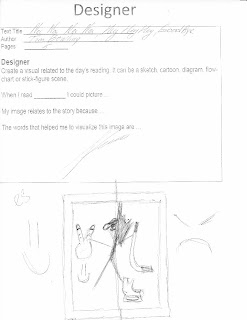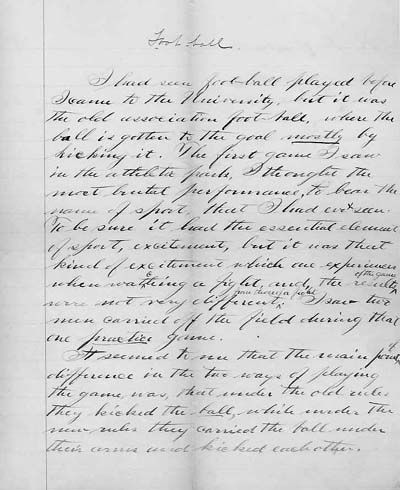Outline:
Review of Chapter 6
Pre-Reading Activity
Summary Activity
Summary Activity
Homework
Tuesday, January 26, 2010
Tuesday, January 19, 2010
Lecture 3: Paragraphs
The outline for today's class:
Introduction to Paragraphs
“The Missing Piece to the Gang-Violence Debate” in Essay Writing
Paragraph Review
Paragraph Activity
Paragraph Activity
Paragraph Test
Homework
Paragraphs:
A paragraph is a collection of related sentences dealing with a single topic
One idea per paragraph
If you begin to transition into a new idea, it belongs in a new paragraph
You can have one idea with several examples of support in one paragraph, but always only ONE idea
Supporting Details:
A New Paragraph:
See page 459-460 in Essay Writing for more examples
Recap:
Beginning - Introduce your idea
Middle - Explain your idea, support with examples, statistics
Conclusion - Make your point again, summarise, transition to next paragraph
Homework:
For Next Class: Read “Kiddy Thinks” 269 and Chapter 6 in Essay Writing
Note: image from North Coast Institute.
Introduction to Paragraphs
“The Missing Piece to the Gang-Violence Debate” in Essay Writing
Paragraph Review
Paragraph Activity
Paragraph Activity
Paragraph Test
Homework
Paragraphs:
A paragraph is a collection of related sentences dealing with a single topic
One idea per paragraph
If you begin to transition into a new idea, it belongs in a new paragraph
You can have one idea with several examples of support in one paragraph, but always only ONE idea
Supporting Details:
- Use examples and illustrations
- Cite data (facts, statistics, evidence, details, and others)
- Examine testimony (what other people say such as quotes and paraphrases)
- Use an anecdote or story
- Define terms in the paragraph
- Compare and contrast
- Evaluate causes and reasons
- Examine effects and consequences
- Analyse the topic
- Describe the topic
- Offer a chronology of an event (time segments)
A New Paragraph:
- Must link with the previous paragraph
- Use transitional words such as:
- Meanwhile
- Furthermore
- Contrastingly
- Consequently
See page 459-460 in Essay Writing for more examples
Recap:
Beginning - Introduce your idea
Middle - Explain your idea, support with examples, statistics
Conclusion - Make your point again, summarise, transition to next paragraph
Homework:
For Next Class: Read “Kiddy Thinks” 269 and Chapter 6 in Essay Writing
Note: image from North Coast Institute.
Wednesday, January 13, 2010
Tuesday, January 12, 2010
Lecture 2: Introduction to Essay Writing
Our outline for today's lecture:
Reading Review
Activity
Writing Process
Activity
Homework
Examples of Graphic Organisers we might use in our class activity:
Revising a Thesis Statement:
Thesis statements that are too vague often do not have a strong argument. If your thesis contains words like "good" or "successful," see if you could be more specific: why is something "good"; what specifically makes something "successful"? Does my thesis pass the "So what?" test? If a reader's first response is, "So what?" then you need to clarify, to forge a relationship, or to connect to a larger issue.
Does my essay support my thesis specifically and without wandering? If your thesis and the body of your essay do not seem to go together, one of them has to change.
Does my thesis pass the "how and why?" test? If a reader's first response is "how?" or "why?" your thesis may be too open-ended and lack guidance for the reader.
Homework:
For Next Class: Read pages 458-460 in Essay Writing
Note: Essay image from Illinois Library. Graphic organiser images from Elgin High School.
Reading Review
Activity
Writing Process
Activity
Homework
Examples of Graphic Organisers we might use in our class activity:
Revising a Thesis Statement:
Thesis statements that are too vague often do not have a strong argument. If your thesis contains words like "good" or "successful," see if you could be more specific: why is something "good"; what specifically makes something "successful"? Does my thesis pass the "So what?" test? If a reader's first response is, "So what?" then you need to clarify, to forge a relationship, or to connect to a larger issue.
Does my essay support my thesis specifically and without wandering? If your thesis and the body of your essay do not seem to go together, one of them has to change.
Does my thesis pass the "how and why?" test? If a reader's first response is "how?" or "why?" your thesis may be too open-ended and lack guidance for the reader.
Homework:
For Next Class: Read pages 458-460 in Essay Writing
Note: Essay image from Illinois Library. Graphic organiser images from Elgin High School.
Labels:
essay,
graphic organiser,
lecture 2,
writing process
Monday, January 4, 2010
Course Texts
Required Texts:
Stott, Jon. C., et al, ed. Harbrace Anthology of Short Fiction. 4th edition. Toronto: Nelson Thomson Learning, 2004.
Stewart, Kay L., Roger Davis et al., Essay Writing for Canadian Students, 6th Edition. Toronto: Pearson, 2008.
Pullinger, Kate and Chris Joseph, Inanimate Alice, Episodes 1-4. http://www.inanimatealice.com/
**Recommended: A good dictionary
Stott, Jon. C., et al, ed. Harbrace Anthology of Short Fiction. 4th edition. Toronto: Nelson Thomson Learning, 2004.
Stewart, Kay L., Roger Davis et al., Essay Writing for Canadian Students, 6th Edition. Toronto: Pearson, 2008.
Pullinger, Kate and Chris Joseph, Inanimate Alice, Episodes 1-4. http://www.inanimatealice.com/
**Recommended: A good dictionary
Course Information

ENGL 108: INTRODUCTION TO LANGUAGE AND LITERATURE
Section: 503 Term & Year: Winter 2009
Course Hours: 45 Credits: 3
Class Time: T 11:00-1:50 Classroom: CAC 439
Instructor: Dr. Jessica Laccetti
Office: CAC 237
Phone: 780-497-4333
Email: laccettijATmacewan.ca
Office Hours: 10:00-11:00
Course Blog: http://engl108lit.blogspot.com/
Note: image from University of Western Ontario.
Subscribe to:
Posts (Atom)

















